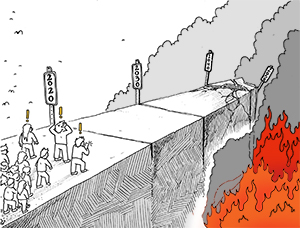Climate anxiety goes unspoken
March 4, 2020
One of the biggest global issues of our time is climate change. We are just starting to see its effects: droughts, floods and fires.
These effects will only get more severe in the future, according to a November 2018 United Nations report.
But there is one effect that goes underreported: anxiety and depression among generations growing up in this warming world.
In recent years, talk of climate change has popped up more in the news cycle, and although reporting on it spreads awareness of the issue, very little of that news is positive.
The prospect of growing up in a world ravaged by the environmental and societal effects of global warming scares many, including myself. What makes this even more hard-hitting is that we contribute to this change individually.
I have been an environmental science major for almost two years and have been feeling this overwhelming sense of dread since my first day.
Many others feel the same as I do, weighed down by the same guilt.
This feeling of guilt is very unhelpful because it isn’t motivating, according to an October 2019 BBC article.
We may sulk in our perceived powerlessness, but we are not powerless. One solution to help get through this negative state of thought is to form support groups and organizations to talk about the issue.
Carbon Conversations is an organization that bills itself as a place for group discussion and planning action to reduce climate impacts. A study in the same BBC article shows most participants had less climate anxiety as a result of the program.
Climate support groups are an effective tool in getting us to accept that both individually and collaboratively, we can play a role in mitigating environmental catastrophe.
In addition to these, a subsequent action to take one’s mind of the perceived hopelessness of the situation is to face the problem head on and play a role in the fight against global warming.
Taking action against climate change can reduce anxiety levels by restoring a sense of agency in the community, according to a November 2019 Time magazine article.
Attending a climate protest, changing your lifestyle to be more sustainable or running for office to have a say in government are just a few things you can do to play a part.
As environmentally conscious students, I believe that climate-related depression and anxiety should be addressed one way or another.
If our University wants its students to feel confident moving forward, maybe it should make an effort to help get us through this crisis.








Jay Goldhaber • Mar 5, 2020 at 12:23 pm
You hit it right on the head!